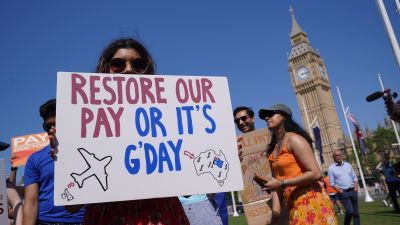Junior doctors ‘in for the long run’ as strikes continue despite 6% pay offer

The face-off continues over public sector pay as junior doctors prepare to strike for a second day despite being made a 6% “final” offer salary rise.
The British Medical Association (BMA) has warned the government that “doctors are in this for the long run” as it refused to call off strikes following the announcement that the Prime Minister had accepted the recommendations of independent pay review bodies.
Professor Philip Banfield, the association’s council chairman, told LBC the chances of further doctor walkouts were “very high”.
He pointed to the Scottish Government’s offer of a 12.4% increase for junior doctors this year compared to around half that being offered to those in England, who are due to take part in the second of a planned five-day stretch of industrial action on Friday.
“It’s equally possible that a UK Government with higher access to funds could make that kind of negotiation possible as well,” Prof Banfield said.
“So I don’t believe that this is all over. I do believe that doctors are in this for the long run because we are seeing so much harm come to patients every day because of the underfunding of the NHS.”
Prime Minister Rishi Sunak has insisted that the pay awards are “final” offers to public sector workers who are striking.
He is offering junior doctors, currently taking part in their longest walkout yet in England, 6% rises, along with an additional consolidated £1,250 increase.
Hospital consultants, set to strike in England next week, will receive a 6% rise.
Mr Sunak said on Twitter that his government will “not be bullied” into “unrealistic” pay demands which he argued risked higher inflation.
The current level of CPI inflation is running at 8.7% and Mr Sunak, who has promised to cut it to around 5.3% by the end of the year, wants to avoid pay increases which could fuel a wage-price spiral.
In a direct message to the public sector unions, the Conservative Party leader said the pay on offer was as far as he would go.
“We will not negotiate again on this year’s settlements and no amount of strikes will change our decision,” he told a press conference on Thursday.
Health Secretary Steve Barclay said the offer to junior doctors and consultants was “fair and reasonable” while balancing the “need to keep inflation in check”.
“We’ve made it clear this pay award is not up for negotiation and urge those unions still in dispute with the Government to end their strikes immediately,” he said in a statement.
The stance puts ministers at odds with the BMA while senior health professionals criticised the decision not to announce extra funding for the pay deals.
With no new borrowing to fund deals, Mr Sunak said government departments will have to “reprioritise” spending – raising fears of cuts across public services.
Matthew Taylor, chief executive of the NHS Confederation, said there is “no fat on the bone” to fund staff pay rises out of existing budgets.
The former Labour adviser told Channel 4 News that any reprioritisation would mean there would be “things we won’t be able to do”.
“Patient services will be jeopardised and actually the Prime Minister’s own waiting list pledge will be jeopardised,” he said.
Dame Meg Hillier, Labour chairwoman of the Commons Public Accounts Committee, told BBC Radio 4’s PM programme there were going to be “some very painful choices for frontline leaders” who she said were already dealing with “overstretched situations.”
Who gets the public sector payrise offer?
The deals, based on the recommendations of the independent review bodies, include:
A 7% rise for police officers.
Prison officers in the operational bands will receive an increase of 7%, with larger rises for support grades and 5% for managers and governors.
Most armed forces personnel will receive a 5% rise, plus an additional consolidated £1,000 increase, with 5.5% awards for the most senior officers.
Senior civil servants will receive a 5.5% rise.
The government set out some changes to raise around £1 billion of additional money to fund the rises, including increasing the immigration health surcharge (IHS) to £1,035 and hiking the cost of some visas.
But the bulk of the money will have to come from “savings and efficiencies” in existing budgets.
The Prison Officers Association said it was considering its options, saying its members “will not be fooled by yet another below-inflation award”.
But the offer was enough to avert autumn term strikes by teachers with four education unions announcing plans to call off strike action.
The 6.5% pay award for teachers will be “fully funded”, the Government said, with £525 million of additional money for schools in 2023-24 and a further £900 million in 2024-25.
Both Mr Sunak and Education Secretary Gillian Keegan have insisted there will be no cuts to frontline teaching as a result of the wage rises.
Want a quick and expert briefing on the biggest news stories? Listen to our latest podcasts to find out What You Need To Know...